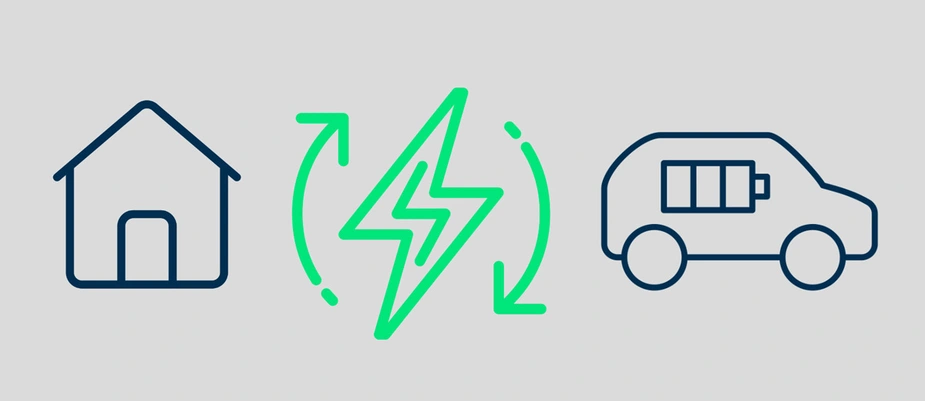Electromobility: Saving costs and facilitating the energy transition through bidirectional charging
Analysis by the Reiner Lemoine Institute published on behalf of the Agora Verkehrswende think tank
Feeding electricity from vehicle batteries into the grid can be financially worthwhile for users of e-cars and at the same time serve the electricity sector. This is illustrated by an analysis by the think tank Agora Verkehrswende, in which possible revenues from bidirectional charging in 2030 were calculated. Agora Verkehrswende recommends making the application of the technology as attractive as possible by reforming the political framework in order to reduce the costs of electric cars on the one hand and to use their storage capacity for the energy transition on the other.
“Electric vehicles offer important flexibility to the electricity system. By feeding electricity from their battery into the grid, they can compensate for fluctuating availability of wind and solar energy and increase grid stability. This enables a larger share of renewable energies in the electricity mix and lower electricity prices. At the same time, the financial incentives can accelerate the ramp-up of electric mobility. In the best case, the electricity costs for the annual mileage of an e-car can be fully compensated for – emission-free at zero cost!”, says Christian Hochfeld, Director of Agora Verkehrswende.
According to the analysis carried out by the Reiner Lemoine Institute on behalf of Agora Verkehrswende, the marketing of electricity in vehicle batteries enables revenues of several hundred euros per vehicle per year. By charging the vehicle when electricity prices are low and feeding it into the grid when electricity prices are higher, it is expected that revenues of up to 500 euros per year can be generated through trading on the electricity market in 2030. If the car is also charged by its own photovoltaic system – and used as storage for the household – the revenues can be even higher.
However, the projected revenues are highly dependent on electricity prices and market conditions. In particular, the German government should make feed-in into the general power grid (“vehicle-to-grid”) more financially attractive – because this application also benefits the electricity sector. One way to do this is through Flexible Connection Agreements (FCAs). They enable grid operators to ensure that charging and discharging are carried out in a grid-compatible manner. In return, they reduce grid fees for temporarily stored electricity, which would significantly reduce individual electricity costs. It would also be helpful to provide more education and build trust among users of e-cars.
A growing number of vehicles and wallboxes now have the prerequisites to implement bidirectional applications. The biggest technical hurdle remains the faltering expansion of intelligent metering systems, so-called smart meters.
“In order to fully exploit the potential of bidirectional charging, reforms of the political framework are necessary,” emphasizes Fanny Tausendteufel, project manager at Agora Verkehrswende. “It is important to create an efficient set of rules that enables viable business models for vehicle-to-grid applications. Anyone who makes the flexibility of their e-car available for the electricity system should also benefit financially.”
For the analysis, existing scientific data and findings were compiled and evaluated and interviews with experts were conducted. The paper lists options for action for the broad use of bidirectional charging as well as calculations for possible revenues in 2030 for three different cases: private e-cars without a photovoltaic system, private cars with a photovoltaic system and commercial trucks with a photovoltaic system.
To the complete analysis “Bidirectional charging” (only in German)
More about the project at the Reiner Lemoine Institute
About Agora Verkehrswende
Agora Verkehrswende is a think tank for climate-neutral mobility based in Berlin. In dialogue with politics, business, science and civil society, the non-partisan and non-profit organisation is committed to reducing greenhouse gas emissions in the transport sector to zero. To this end, the team develops scientifically sound analyses, strategies and proposed solutions. Agora Verkehrswende was initiated at the beginning of 2016 by Stiftung Mercator and the European Climate Foundation. The two foundations are shareholders.
www.agora-verkehrswende.de
Contact:
Reiner Lemoine Institute
reiner-lemoine-institut.de
Jakob Gemassmer
Project leader
+49 (0)30 1208434-85
jakob.gemassmer(at)rl-institut.de
Julian Brendel
Researcher
+49 (0)30 1208434-34
julian.brendel(at)rl-institut.de
Gombodshaw Boß
Researcher
+49 (0)30 1208434-39
gombo.boss(at)rl-institut.de
RLI press release, 4 November 2025
